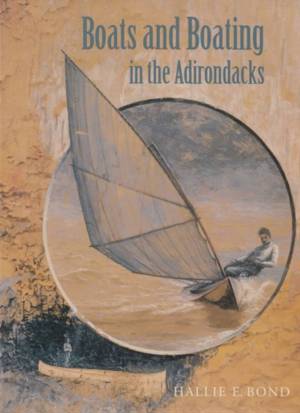
- Afhalen na 1 uur in een winkel met voorraad
- Gratis thuislevering in België vanaf € 30
- Ruim aanbod met 7 miljoen producten
- Afhalen na 1 uur in een winkel met voorraad
- Gratis thuislevering in België vanaf € 30
- Ruim aanbod met 7 miljoen producten
Zoeken
€ 41,95
+ 83 punten
Omschrijving
Adirondack history is a tale written o the water. In the Adirondacks, people have traveled, conducted warfare, hunted and fished, gone to church, proposed marriage, and driven logs in, on, from, or by water. Without boats, small and large, Adirondack history--social, recreational, commercial, and environmental--would be an affair entirely different from what we have come to know.
In this lavishly illustrated account, Hallie E. Bond presents a history of these boats--canoes, sailboats, power launches, outboards, and the indigenous guideboat--that figure prominently in the overall history of the Adirondacks. The pre-contact Indians paddled dugout and bark canoes; in the seventeenth and eighteenthcenturies these craft were joined by skiffs and bateaux. Between 1820 and World War II, a distinctive tradition of boat building developed, culminating in the famous Adirondack guideboat. As the nineteenth century progressed, a variety of small, fresh water, musclepowered boats was produced in the Adirondacks--an assemblage matched by only a few places in the country. There were the canoes and the men that made them famous--John Henry Rushton and Nessmuk--and the guideboats and their builders--H. Dwight Grant and Willard Hanmer. In the early twentieth century, the development of the internal combustion engine irrevocably changed not only boat use and design, but life and leisure in the Adirondacks. Bond skillfully captures the whole panorama of boats and boating in the Adirondacks, from early dugouts and bateaux to the highpowered inboards that won Gold Cup races on Lake George and the Kevlar pack canoes of today. Drawing on her experience as an historian and Curator of Collections and Boats at the Adirondack Museum, Bond places events and trends of the region in the context of national and international history and describes the significant contribution of the Adirondacks in the early twentieth-century development of recreation and travel in America. Boats and Boating in the Adirondacks also includes a descriptive catalog of boats from the museum's own collection with nearly two hundred illustrations in addition to those in the narrative, a list of boatbuilders active in
the North Country before 1975, and a valuable glossary of terms.
Specificaties
Betrokkenen
- Auteur(s):
- Uitgeverij:
Inhoud
- Aantal bladzijden:
- 334
- Taal:
- Engels
- Reeks:
Eigenschappen
- Productcode (EAN):
- 9780815603740
- Verschijningsdatum:
- 1/08/1998
- Uitvoering:
- Paperback
- Formaat:
- Trade paperback (VS)
- Afmetingen:
- 212 mm x 287 mm
- Gewicht:
- 1233 g

Alleen bij Standaard Boekhandel
+ 83 punten op je klantenkaart van Standaard Boekhandel
Beoordelingen
We publiceren alleen reviews die voldoen aan de voorwaarden voor reviews. Bekijk onze voorwaarden voor reviews.











